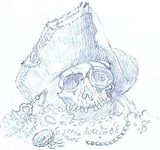http://www.wikihow.com/Flesh-out-a-Country-or-Region-in-Your-Fantasy-RPG-World
Información:
How to Flesh out a Country or Region in Your Fantasy RPG World
Edited by Zach Haffey, Maluniu, Glutted, Nicole Willson and 5 others
Hello game master/fantasy author. This is a guide to organizing and sorting out the finer details and aspects of a specific country or region of your world: a format for the living details that help you and your players delve in to the role-playing aspect of your game.
EditSteps
- 1Short Introductory Summary - Give a one or two paragraph overview of the region or country, highlighting something unique or unusual about it and where it is geographically in your world.
- 2Life, Society and Culture - This section should detail the culture(s) of the people who populate the region. Make sure to consider and cover the following:
- Social Dynamic: Are there different races, clans or tribes within the region? How do the people treat each other and outsiders on an individual basis? Any out of the norm national or domestic traditions or practices? On a larger scale, what is the overall societal feel of the region? Perhaps it's coming apart at the seams from civil war, with roving death squads or maybe there's a tentative peace. On the other extreme it could be highly patriotic or religious, full of tight-knit, radical nationalists or zealots...
- Fashion and Language: Decide how the people of the area dress, how they adorn themselves (popular jewelry, hairstyles, tattoos?), their language(s) and how they speak.
- Calendar: What are some holidays, festivals or other popular observances?
- Religion: What is the dominant religion, if any, and how powerful is the priesthood?
- Art: Cover some artistic output and distinctions: music, high art and folk art, literature, folklore, theater, architecture...
- Come up with one or two other societal and social aspects, like caste systems or major cultural taboos.
- Social Dynamic: Are there different races, clans or tribes within the region? How do the people treat each other and outsiders on an individual basis? Any out of the norm national or domestic traditions or practices? On a larger scale, what is the overall societal feel of the region? Perhaps it's coming apart at the seams from civil war, with roving death squads or maybe there's a tentative peace. On the other extreme it could be highly patriotic or religious, full of tight-knit, radical nationalists or zealots...
- 3Law and Leadership - What type of government and law does the country have? Legal punishments and consequences. Are there any specific laws governing magic? Are servants and landholders free/serfs/indentured/slaves? What is the judicial system like, if there is one (a trial or hearings, representation, guilty-until-proven-innocent/vice versa, thrown in the dungeon and wait for the Holy Fruit Bats of Kayobish to decide...)? What other fundamental rights do people have under the law, again, if any (property rights, parental responsibilities, due process)? What are the rulers like? Are there different duchies, protectorates or provinces with different laws? Are the rulers themselves of the regular variety (officials, nobles, bureaucrats) or unusual (mages, undead lords, priests)?
- 4Region Specific Groups and Internal Politicking - Provide details on influential, local interest or power groups in the area: a strong ruling family, an influential priesthood, thieves' guilds, good or evil mage cabals, druid circles, competing political factions, secret societies all make good ones.
- 5International Influence and Politicking - Decide how much interest and influence the region has with the rest of the world, if any, and how the rulers, ambassadors and dignitaries go about achieving their goals.
- 6Relations with Neighboring Lands - What interaction does the region have with its actual geographical neighbors? Are they a conquering empire or do they trade and interact peaceably? Are there old feuds or alliances? Could they care less about each other?
- 7Trade, Commerce and Industry - What makes the country money? What do they import? What do they export? Are there taxes of any kind (usually yes if it's a kingdom)? What are the local resources (from the land and the populace)? How much influence do the merchants and traders have? Describe the country's specific currency system if they have one, or do they barter or trade gems or something else? Are there any disproportionate gaps in economic classes that could potentially cause trouble?
- 8Wartime - Describe the military capabilities of the country or region. How advanced or crude are their tactics, weapons and war machines? How about standing forces versus reserves? Drafting? How do they all coordinate and react in times of war and conflict? Does the army hire mercenaries? How many? What kind? What arcane-aided tactics do they employ (undead or supernatural troops, magical weapons among the forces, war wizards or, for the overly dramatic, flame throwers)?
- 9Landscape, Weather and Ecosystem - Give an overview of the land itself, its appearance and demeanor. Describe some outstanding flora and fauna, unusual or magical things included. What kinds of "uncivilized" humanoids live in the wilderness? Describe the major weather patterns of the region. How does the local geography and weather effect the populace, if at all (if it's a mercantile society are they coastal and sea-faring merchants or maybe land-bound nomad traders)? Create one or more encounter tables for the wilderness.
- 10Notable Geography - Provide detail on any outstanding geographical features found within the country's borders. Are there stone arches or canyons? Lush river valleys? A vast field of geysers? Forests, cave networks? A mile-high cliff or waterfall? A magical desert in the middle of a jungle? Limestone cliffs that fall into the ocean when there's an earthquake, causing immense tsunamis?
- 11Notable Sites - Describe cities, towns, villages, camps, ruins, dungeons, castles, keeps, fortresses, blockades and other humanoid-made sites or land-marks. Cities and dungeons often need detailed descriptions all on their own. Do it now if you're inspired or get a general feel for them, then, work out the details after you've finished your country. Create encounter tables for cities and dungeons.
- 12Routes and Trails - Plot out main routes between cities, sites as well as other trails in the wilderness. Also use this section to describe the main types of transportation found within the region as well as any prominent nearby currents or maritime trade routes for sea-faring cultures.
- 13Regional History - Provide a rich history for the region, why the people and the land are the way they are. Try to deviate from the standard RPG historical interactions (that is, 'barbarians fought the mages' or 'dragons attacked'). Come up with a few twists to make it interesting. For example, perhaps the dwarves and the gnolls are loyal allies after they had to band together thousands of years ago to fight an even greater evil. Maybe the gnolls even let the dwarves ride them into battle now. Figure out why.
- 14Other Region-Specific Segments - Think on any other important details about the country not listed above and write them down.
- 15Plots, Rumors and Current Events - Encounter ideas and adventure starters. What is happening currently in the region (specifically things that could involve the PCs)? Are there coups or power-plays in the making? Is a colossal monster, plague or natural disaster about to strike? Maybe all is well and quiet for a change or maybe happenings here could affect the entire continent or world.
- 16Character Concepts and Player Character Notes - List two or three types of PCs that are likely to come from this region, using the culture and history backgrounds as a guide. Note here if there are any popular mercenary or adventuring companies in the area and how adventurers are treated.
- 17Non-Player Characters - Create full stats for one or two prominent NPCs from your area and provide for them a background story, fitting it in to the regional flavor and history. Use them to maybe introduce your players into the area.
EditTips
- And for other topics, your providing these details will inspire ideas for larger, overarching plot-lines and the workings of still other regions of your land. Make sure to write these mini-inspirations down and keep track of them.
- For certain topics some regions will have minimal entries or none at all. A nomadic, mountain dwelling barbarian people would usually have no international intrigue and their commerce/trade entry might just say "furs, boars and women".
- Draw at least a rudimentary map of your area and expand from there as you add more regions. You will need it. It helps to have a baseline from where to start with rather than keep going back to square-one when you find something wrong.
- Would-Be Fantasy Authors would do well to detail the above for their setting(s), too. A stand-out, memorable novel is usually backed up by pages and pages of reference material written by the author before they even begin.
EditWarnings
- It is important that you do the geography and their respective biomes first before embarking on the making of the country's people, their infrastructure and their culture if you're up to making your country believable. History has proven many times over that it's not the man that makes the land, but it's the land that makes the man. Things like mountains, rivers, the local flora & fauna and other permanent stuff ultimately decide many factors like viable/strategic locations for settlement/skirmishes, the placement of merchant and travel routes, etc.
- Creating a detailed campaign world from the ground up, even a country let alone a continent, is quite an undertaking.
EditRelated wikiHows
Article Info
Categories: Role Playing Games
Recent edits by: Cece, Puppy1843e, Rebecca









No hay comentarios:
Publicar un comentario